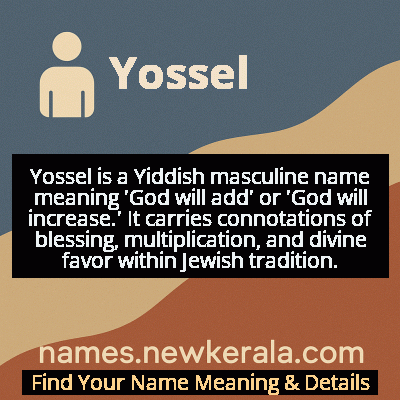Yossel Name Meaning & Details
Origin, Popularity, Numerology Analysis & Name Meaning of Yossel
Discover the origin, meaning, and cultural significance of the name YOSSEL. Delve into its historical roots and explore the lasting impact it has had on communities and traditions.
Name
Yossel
Gender
Male
Origin
Lucky Number
5
Meaning of the Name - Yossel
Yossel is a Yiddish masculine name meaning 'God will add' or 'God will increase.' It carries connotations of blessing, multiplication, and divine favor within Jewish tradition.
Yossel - Complete Numerology Analysis
Your Numerology Number
Based on Pythagorean Numerology System
Ruling Planet
Mercury
Positive Nature
Adventurous, dynamic, curious, and social.
Negative Traits
Restless, impatient, inconsistent, prone to indulgence.
Lucky Colours
Green, white.
Lucky Days
Wednesday.
Lucky Stones
Emerald.
Harmony Numbers
1, 3, 9.
Best Suited Professions
Sales, marketing, travel, entertainment.
What People Like About You
Versatility, charisma, adventurous spirit.
Famous People Named Yossel
Yossel Birstein
Writer and Poet
Polish-born Israeli Yiddish writer known for his poignant Holocaust literature
Yossel Bergner
Painter
Israeli painter known for his surrealist works and illustrations for Yiddish literature
Yossel Rakover
Literary Character
Fictional character from 'Yossel Rakover Speaks to God,' a powerful Holocaust testament
Yossel Maslansky
Cantor and Composer
Renowned cantor and composer of Jewish liturgical music in pre-war Europe
Name Variations & International Equivalents
Click on blue names to explore their detailed meanings. Gray names with will be available soon.
Cultural & Historical Significance
In contemporary Jewish culture, Yossel functions as a cultural touchstone—a name that connects modern Jews to their ancestral past while affirming the continuity of Yiddish language and traditions. It's often chosen by families seeking to honor their Eastern European roots or to maintain linguistic and cultural traditions within increasingly assimilated Jewish communities. The name also represents the ongoing revival of interest in Yiddish culture among younger generations of Jews worldwide, serving as a bridge between historical identity and modern Jewish expression.
Extended Personality Analysis
People named Yossel are typically associated with deep emotional intelligence, strong family loyalty, and a quiet, thoughtful nature. The name suggests someone who values tradition and continuity, often serving as the emotional anchor in their social and family circles. Yossels are perceived as having a grounded, practical wisdom combined with intuitive understanding of others' needs—qualities that make them excellent listeners and trusted confidants. There's an inherent warmth and approachability to the name, suggesting someone who builds strong, lasting relationships based on mutual respect and genuine care.
The historical and cultural weight of the name also implies a certain resilience and depth of character. Yossels are often seen as people who understand struggle and perseverance, carrying both personal and collective memory with grace. They tend to be bridge-builders who can navigate between different worlds—traditional and modern, Jewish and general society—while maintaining their core identity. The name suggests a person who honors the past while engaging thoughtfully with the present, making them valuable mediators and cultural translators in diverse settings.
Modern Usage & Popularity
In modern times, Yossel maintains a distinctive presence primarily within traditional Jewish communities and among families with strong Ashkenazi heritage. While it doesn't rank on mainstream baby name lists, the name has experienced a modest revival as part of the broader Yiddish cultural renaissance. It's particularly popular in Orthodox and Hasidic communities where Yiddish names are valued for their cultural authenticity and historical significance. The name is often chosen by parents seeking to honor grandparents or ancestors from Eastern Europe, serving as a living connection to family history. Among secular Jews, Yossel is sometimes selected as a meaningful alternative to more common Hebrew names, reflecting a desire to reclaim and preserve Yiddish linguistic heritage. Its usage patterns show it's most common in Jewish communities in Israel, North America, and Western Europe with Eastern European roots.
Symbolic & Spiritual Meanings
Symbolically, Yossel represents cultural endurance and the transmission of heritage across generations and geographies. The name embodies the concept of 'l'dor v'dor'—from generation to generation—serving as a living link between past and present. It symbolizes the resilience of Jewish identity despite historical persecution and displacement, representing how cultural traditions can survive and adapt through the most challenging circumstances. Metaphorically, Yossel stands for the idea that names carry not just personal identity but collective memory and responsibility.
The name also symbolizes the bittersweet beauty of cultural preservation—the joy of maintaining traditions alongside the sorrow of remembering what was lost. It represents the ongoing dialogue between mourning and celebration that characterizes much of Jewish historical consciousness. In a broader sense, Yossel serves as a symbol for all endangered cultural traditions and languages, reminding us of the importance of preserving diverse human expressions in an increasingly homogenized world.

